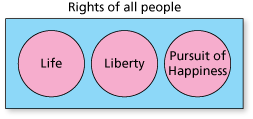-
There are several ways to draw a set diagram that help understand the quotation from the Declaration of Independence. The diagram in Example 1 shows only one possibility. To understand a statement, it is helpful to shorten it and write it in outline form.
All people have equal rights, which include:
(a) the right to Life
(b) the right to Liberty
(c) the right to Pursue Happiness.
Here is an alternative way to draw a set diagram for this information.

Note that different set diagrams help you see different aspects of a statement. The set diagram in Example 1 points out that creatures other than humans (such as dogs) may have these rights. The set diagram above points out that there may be other rights that all humans have (such as the right to worship).
-
The Bill of Rights is located in the National Archives Building in Washington, DC. If you would like to learn more about the Bill or Rights, and are unable to make the trip to Washington D.C., visit The Charters of Freedom website. You can download the Bill of Rights, and the other charters of freedom including The Declaration of Independence and The United States Constitution.
-
The 10th Amendment in the Bill of Rights: "The powers not delegated to the United States by the Constitution, nor prohibited by it to the States, are reserved to the States respectively, or to the people."
The amendment is often quoted to defend "state rights." When you examine the statement, however, you can see other implications. The amendment basically states that all power falls into four categories: power given to federal government, power denied to anyone, power given to a state, and power given to an individual. One would wish that the amendment was more precise ... with examples.

Note that the amendment does not specify which powers are clearly given to individuals.This is a matter of great political debate. For instance, simply because you live in a state, does this give the state the power to insist that you pay sales tax on items purchased in other states?
-
Comments (2)
These comments are not screened before publication. Constructive debate about the information on this page is welcome, but personal attacks are not. Please do not post comments that are commercial in nature or that violate copyright. Comments that we regard as obscene, defamatory, or intended to incite violence will be removed. If you find a comment offensive, you may flag it.
When posting a comment, you agree to our Terms of Use.Showing 2 commentsSubscribe by email Subscribe by RSSGuest 1 decade ago |Thanks for pointing out that animals might have as many rights as people.0 1Ron Larson (author)1 decade ago |I love this example. Whenever I read the Declaration of Independence or the Bill of Rights, I get a shiver.1 0





